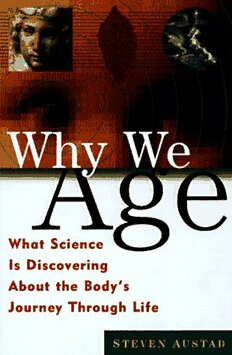
Why We Age: What Science Is Discovering about the Body's Journey Through Life PDF
272 Pages·1997·3.028 MB·English
Most books are stored in the elastic cloud where traffic is expensive. For this reason, we have a limit on daily download.
Preview Why We Age: What Science Is Discovering about the Body's Journey Through Life
Description:
Why has the lifespan of the average American increased from 48 to 75 years in this century alone? Is the body a machine that simply wears out? If so, why do some cells seem immortal? What can we learn from the fact that different animals age at different rates? Will we find a gene for aging? Will we be able to control it? Is there any basis to the claims being made for melatonin and DHEA as antiaging drugs? Aging has long occupied a central position in the collective human consciousness. Now, in this eye-opening new book, biologist Steven Austad investigates the history, the theories, and the personalities behind the quest to understand it. In Why We Age, he offers real evidence from the front lines of research that science is finally closing in on its fundamental processes. A leading expert on aging, Dr. Austad clears away the clutter of exaggeration and folklore to present a full picture of the new understanding of what aging is, why it happens, and—most provocatively—whether it can be controlled. Drawing on the latest developments in such fields as evolutionary biology, comparative zoology, anthropology, and basic medical research, Austad surveys and synthesizes an enormous amount of material. He explores the basic concept of longevity and the various ways we measure it, and analyzes the claims of greatly extended lifetimes—as well as our eagerness to believe them. In anecdotes that read like detective stories, Austad tracks down outrageous examples of age inflation from around the world and throughout history, from the celebrated seventeenth-century case of Thomas Parr, who was buried with great honor in Westminster Abbey for his false claim of having lived more than 150 years, to intriguing tales from Pakistan, the Caucasus, and Ecuador. As he describes the different responses of neurologists, cardiologists, and evolutionary and cell biologists to key questions on the causes of aging, Austad paints illuminating portraits of such renowned scientists as J. B. S. Haldane and Peter Medawar, both major contributors to our understanding of why we age. We learn how long-term exposure to certain hormones, especially estrogen and testosterone, affects longevity, and how new therapies made possible through advances in molecular biology offer hope for slowing aging and extending life. A fascinating testament to the dawning of a new era in science, Why We Age, like all the best science writing, offers a new and profound understanding of life itself. "I hope to convey some of the colorful history of the field, the parade of ideas, the outsized personalities, the key experiments and experimenters, as well as our current excitement and the reasons for it. . . . I would hope that both the lay and professional reader might learn to think about aging without terror or tears, to think about it as an intriguing puzzle rather than a gloomy inevitability."—from the Preface
See more
The list of books you might like
Most books are stored in the elastic cloud where traffic is expensive. For this reason, we have a limit on daily download.
